Video
youtube
Soooooo I had the day off of work and i decided to spend as much time as possible studying languages!
I tried to study German and Italian all day and this is how it went 👀
#soulbutter languages#learn a language#how to learn german#how to learn a language#how to learn italian#learn german#learn italian#soul butter#soul butter languages#learn languages#language learning#langblr#langblog#german langblr#french langblr#Deutsch lernen#deutsche sprache#la lingua ditaliana
28 notes
·
View notes
Text
99 legal sites to download literature
The Classics
Browse works by Mark Twain, Joseph Conrad and other famous authors here.
Classic Bookshelf: This site has put classic novels online, from Charles Dickens to Charlotte Bronte.
The Online Books Page: The University of Pennsylvania hosts this book search and database.
Project Gutenberg: This famous site has over 27,000 free books online.
Page by Page Books: Find books by Sir Arthur Conan Doyle and H.G. Wells, as well as speeches from George W. Bush on this site.
Classic Book Library: Genres here include historical fiction, history, science fiction, mystery, romance and children’s literature, but they’re all classics.
Classic Reader: Here you can read Shakespeare, young adult fiction and more.
Read Print: From George Orwell to Alexandre Dumas to George Eliot to Charles Darwin, this online library is stocked with the best classics.
Planet eBook: Download free classic literature titles here, from Dostoevsky to D.H. Lawrence to Joseph Conrad.
The Spectator Project: Montclair State University’s project features full-text, online versions of The Spectator and The Tatler.
Bibliomania: This site has more than 2,000 classic texts, plus study guides and reference books.
Online Library of Literature: Find full and unabridged texts of classic literature, including the Bronte sisters, Mark Twain and more.
Bartleby: Bartleby has much more than just the classics, but its collection of anthologies and other important novels made it famous.
Fiction.us: Fiction.us has a huge selection of novels, including works by Lewis Carroll, Willa Cather, Sherwood Anderson, Flaubert, George Eliot, F. Scott Fitzgerald and others.
Free Classic Literature: Find British authors like Shakespeare and Sir Arthur Conan Doyle, plus other authors like Jules Verne, Mark Twain, and more.
Textbooks
If you don’t absolutely need to pay for your textbooks, save yourself a few hundred dollars by reviewing these sites.
Textbook Revolution: Find biology, business, engineering, mathematics and world history textbooks here.
Wikibooks: From cookbooks to the computing department, find instructional and educational materials here.
KnowThis Free Online Textbooks: Get directed to stats textbooks and more.
Online Medical Textbooks: Find books about plastic surgery, anatomy and more here.
Online Science and Math Textbooks: Access biochemistry, chemistry, aeronautics, medical manuals and other textbooks here.
MIT Open Courseware Supplemental Resources: Find free videos, textbooks and more on the subjects of mechanical engineering, mathematics, chemistry and more.
Flat World Knowledge: This innovative site has created an open college textbooks platform that will launch in January 2009.
Free Business Textbooks: Find free books to go along with accounting, economics and other business classes.
Light and Matter: Here you can access open source physics textbooks.
eMedicine: This project from WebMD is continuously updated and has articles and references on surgery, pediatrics and more.
Keep reading
104K notes
·
View notes
Text
Fav Langblrs
Week 2, day 7 of prepolyglot’s langblr reactivation challenge
linguistness - lots of cool langblr but also linguistics content (German, Swedish, French, Czech)
cumbiana - phd life with some Spanish and langblr content thrown in
spanishskulduggery - really helpful explanations about Spanish grammar and vocab
thetudes - lots of useful resources for French
3oey - cute vocab drawings for Russian :3
tealingual - tonnes of resources for tonnes of different languages, great for resource masterposts
sciogli-lingua - several languages but especially Italian
pompadourpink - the ultimate authority on the French language as far as I'm concerned forget L'Académie Française
linguenuvolose - language study and general life posts, just a nice vibe
fluencylevelfrench - French and also book recs
95 notes
·
View notes
Video
youtube
I studied Russian everyday for two hours and this is what I learned.
Let me tell you, this challenge was a LOT. It was very difficult to fit everything I wanted to accomplish in the span of two hours in addition to finding two hours a day to study.
This video discusses:
- my plan for the week
- the resources used
- time management
- the notion setup
- how it went / what I learned
#how to learn russian#soulbutter#soulbutter languages#learn russian#langblr#study blog#Russian language#russian langblr#langblog#study russian#how to learn a language#Learn French#Learn German#study with me
56 notes
·
View notes
Text
A Complete Guide To Becoming Conversational In French

I’m basing this off of this post I wrote a while back, as well as my own experiences. I’ll also copy one of my other posts onto here for the beginner section. Also, check out this post to see what level you are at and where you need to begin.
Beginner (A0 to A1)
I would recommend studying this amazing pronunciation guide by @frenchy-french. Then, I would recommend that you start shadowing and speaking. Try shadowing (i.e. repeat what is being said after the speaker) a beginners podcast like FrenchPod101 (paid) or Coffee Break French (free).
You can try using an app to learn some basic vocabulary. Duolingo and Memrise are my personal favourites. You can also use Drops if you don’t want to translate vocabulary. Try using it daily (it’ll take at most 5 minutes a day).
Complete an online course or textbook. Here is an article with some recommendations for textbooks. Here is a link to a drive full of textbooks, where you will surely find something for French (credit to @salvadorbonaparte for providing this resource). As for online courses, here is a list of some places to find courses: Open Culture, Class central, Effective Language Learning and Loecson.
Make a native friend and start texting them. You can go on r/Language Exchange, or text them on HelloTalk or Tandem. You could also find a buddy on a language discord. Remember to be safe, and not reveal any private information. Look up words as you go, and try texting only in French the whole time. Start doing this as early as possible. Once you have become more confident texting and/or sending voice messages, try a phone call. You can also practice speaking using HiLokal.
Memorise some basic vocabulary and grammar. This post by @frenchy-french is the best for this. For vocabulary, you can use flashcards (like Anki, Quizlet and Memrise). Also, try Kwiziq for grammar.
Immerse. For now, try listening to lots of music, and watch a bunch of fun YouTube videos (like the ones by Cyprien, and Montreaux Comedy). Also, use the language filter on AO3 to look up fanfiction in French. Switch your phone’s language to French, and follow a bunch of French people on social media.
Beginner to intermediate (A1 to B1)
At this level, I would suggest using a textbook or online course. The ones I mentioned earlier might be helpful. Personally, I used GCSE textbooks. I used this Studio 9-1 textbook (good for practicing skills), and this CGP textbook (good for grammar and vocabulary, lots of practice questions). It’s also worth checking out Z-library to see if you can find something for free.
Try working through a grammar book. My personal favourite is the Practice Makes Perfect Complete French Grammar textbook (you can probably find it on Z-library). If you don’t want to use a grammar book though, the second season of Coffee Break French is good too (or you could use it to consolidate your knowledge). Do practice questions if you want, or maybe make a cheat sheet. Don’t forget to use what you learn in your writing and speaking!
Expand your basic vocabulary. You can use a course on Memrise (here is the one I used) or find some vocabulary lists online to learn (the GCSE specification is great to choose topics). You can use flashcards (like Quizlet and Anki), columns or association: whatever works for you. After you have learnt the ones you need for general communication (the GCSE specification might be a good guide for this), I would suggest learning some vocabulary lists about topics that interest you in particular. As well as this, generally try to learn vocabulary you encounter when reading and writing. Remember to use example sentences when learning vocabulary!
Do you remember those speaking buddies you were meant to meet earlier? Well, keep speaking with them. If you’re nervous, try to memorise some set phrases and questions to keep the conversation going. Don’t be afraid to ask someone to slow down, or speak more clearly. Do it as often as you can. You can also continue texting your buddies too. Again, try and stay safe.
Continue to immerse using the methods that I mentioned earlier. You can try watching films and TV shows with English or French subtitles, but I doubt that they will be helpful at this stage. Personally, I read fanfiction, (usually translations of my favourite fics) articles and watched YouTube videos. The articles and YouTube videos were often meant to offer advice about things, since self-help stuff is often quite simple. Just a quick tip.
Watch children’s shows in your target language. Shows like Peppa Pig and the little princess would be good. Just get used to the sounds of the language.
Find a guided reader, or learners exercises (like Lingua), and read them. Also, you could try reading these short stories (recommendations by @frenchy-french).
Shadow Easy French (i.e. repeat what is being said, and imitate the intonation and accent).
Try keeping a journal in French. Every day, just write two or three sentences in the language. For some ideas about what to write, here is a wonderful set of questions by @myhoneststudyblr.
Engage with intermediate French content. I like InnerFrench, RFI: Savoirs, Piece of French and FrenchPod101. Don’t be discouraged if you can’t understand much at first.
Intermediate to conversational (B1 to B2)
Listen to intermediate French podcasts and youtube videos like the ones that I mentioned earlier. Here is an article which lists some good intermediate podcasts. You can also just look up “intermediate french listening practice” and find some good stuff. Try listening without a transcript at first, and then read and listen at the same time.
Continue shadowing native material. Once again, I recommend Easy French for this.
Try watching TV shows and films. Here are some recommendations for TV shows. You can also watch things you’ve seen already dubbed in French, like Disney films. Also, you can use a platform like LingoPie (if you have the funds - I highly recommend it if you do). Make sure that what you choose is not too difficult, and that there is no needless jargon or complex language.
Try to keep a journal in French. Just write about your day, and also your various thoughts and opinions on certain topics. You can also try writing reviews for books and movies, and record vocabulary from there. For some entries, type them up and post them on Journaly for corrections.
Speak with your speaking buddies! Try and learn how to speak around words (i.e. learn how to describe the meaning of the word you are looking for if you can’t remember it).
Work through a grammar book. Keep doing the practice questions, and actively use what you learn in your speaking and writing.
Read articles, fanfiction and books. For articles, I can recommend Le Monde and Liberation. It’s good to keep up with what is going on in France, so give it a shot. For books, I would suggest reading translations of books that you have already read in your native language (this also applies to fanfiction if there is a translation available). Here are some recommendations for native French books. Pick something you like and go for it! As for fanfiction, here is how to filter languages on AO3 and WattPad.
Watch YouTube videos in French. Here are some youtubers you might want to check out.
Watch the news in French. I personally use FranceInter and TV5monde.
Write short stories and essays in French. Perhaps try lifting phrases and vocabulary from books and fanfiction you read? If you write an essay, make it about a topical issue like abortion or the role of family in society (here are some topics for intermediate essay topics). Also, here are some essay phrases.
Needless to say, you will have to continue learning French vocabulary using whichever methods you prefer. Perhaps you can explore @frenchy-french’s vocabulary tag?
And that’s it so far! If you want to go from intermediate to advanced, try to follow this advice in this post by @frenchy-french. Thanks for reading this post! I hope it was useful to you!
3K notes
·
View notes
Text
french language resources masterlist
Last updated: 13/01/2023
Websites
RFI Savoirs has lots of listening and reading activities (from A1 to B2)
Apprendre le français TV 5 Monde has listening activities from A1 to B2
Tester son niveau - this is a free placement test (just listening)
CNTRL Dictionnaire is a dictionary
France Université Numérique - free MOOCS (massive open online course) with different levels: Level A1 - Level A2 - Level B1
Music
French songs you should listen to
french aesthetic songs (youtube)
Crème French playlist (youtube)
Books/Reading
GEO Magazine is a online magazine with articles about nature and history
Library Genesis has many books in french and other languages too
TV/Movie
TV 5 Monde has series and movies from France and other countries (for free), available for desktop and mobile (ios and android)
TV 5 UNIS has series and movies in French (mostly from Quebec). Some of the shows are not available outside Canada (but you can use it with a vpn)
Podcasts
Artips podcast (art, music, science)
France culture podcasts (various subjects)
Apps
WLINGUA app (both IOS and Android) teaches grammar
Other
French grammar pdf exercises - if you search the topic you're learning (example: le passé composé) + pdf, you're going to find many pdf activities from University of Quebec. Like this one: Passé Composé UQuebec
Artips is a newsletter about art, music, science and ecology that you receive in your email. You can chose the topics you wanna subscribe (example: I subscribed for art and music newsletters).
Bon courage !
2K notes
·
View notes
Text
Learn French with Netflix !

Want to improve your listening comprehension in new, interesting ways? Well watching television certainly isn’t a new learning-hack, but here is the best of French TV and films which are available to you through Netflix or Youtube.
youtube
In this video I talk about:
- listening resources
- recent French television that helped me improve and kept me interested
- what to look for when learning with TV
- beautiful actors of France 💕
#How to learn French#Learn French#how to learn a language#how to stay motivated#language learning#learn a language#netflix#french netflix#soulbutter#soul butter#soul butter language goals#soul butter languages#soulbutter languages#french language#Speak French#french#language#languages#french langblr#french langblog
18 notes
·
View notes
Text
Building Habits for Language Learning

Possibly the most important thing you can do when looking to learn a language, is to carve it into your daily schedule. Once you make a habit out of it, the discipline which you have created for yourself will help carry you through the advanced stages of this language.
In this video I discuss my goals I set for myself in 2023 and how I will accomplish them.
youtube
As a follow up, I have created this January Recap in which I talk about my progress so far and how I build these habits while maintaining a full work-week.
youtube
specifically, I discuss:
- setting reasonable goals
- obtaining some while putting others on the back-burner
- burnout and how to avoid it
- what it means to be productive
- SPECIAL BONUS; what we can learn from the French 32-hour work-week
I hope it is helpful!
#language learning#how to learn a language#How to learn French#how to learn german#how to learn russian#how to stay motivated#avoid burnout#soulbutter#soulbutter languages#soul butter#soul butter language goals#soul butter languages#youtube#goals#setting goals#burnout#productivity#language#languages#french language#German language#langblog#langblr#russian langblr#french langblog#german langblr#Learn French#learn german#learn Russian
138 notes
·
View notes
Text
How to Maximize your reading in a Language
Hey folks! As a follow up to my other post on the matter, I’ve made a video which is a bit more comprehensible and I’ve added some new tips.
youtube
In this video I discuss:
- what you should be focussing on your level (beginner, intermediate, advanced)
- out of the box reading suggestions that aren’t just kids books
- the vocabulary to focus on
I hope this helps ! Let me know what kind of content you want to see from me!
#soul butter#soul butter languages#languages#how to learn a language#How to learn French#how to learn german#how to learn russian#langblr#french language#language learning#German language#Learn French#Speak French#french langblr#french langblog#german#Learn German#german langblr#german langblog#russian#learn russian#russian langblr#russian langblog
138 notes
·
View notes
Text
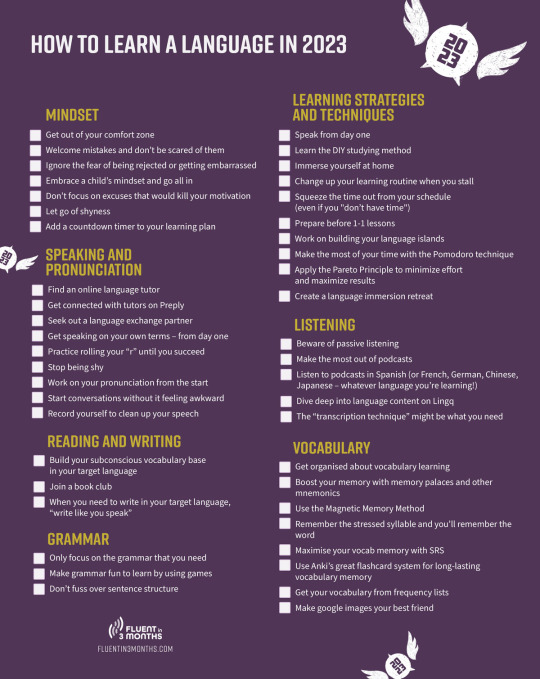
Thinking about making goals out of some of these for this year!
239 notes
·
View notes
Text
The Official Lingoda Sprint Review

Hello folks ! I tried the Lingoda Sprint and these are my thoughts about it. If you are curious about the platform or what the classes are like in this program, then this is the video for you.
I discuss
what Lingoda is
how it differs from different platforms like Duolingo and iTalki
the pros and cons
the challenges
would I recommend this to others
So without further ado, here you go !
youtube
#lingoda#lingoda sprint#language learning#learn a language#how to learn a language#How to learn French#languages#language#foreign languages#foreign language#langblr#french language#German language#langblog#russian langblr#german langblr#french langblr#soulbutter#soul butter#soulbutter languages#language acquisition
26 notes
·
View notes
Text
You are learning German and are at least mildly interested in history?
Let me put you on something:
Ernst H. Gombrichs: Eine kurze Weltgeschichte für junge Leser
The author wrote considering that if you really try, you can explain absolutely everything to a child and specifically does not want his book to be seen as something you have to study (memorize dates and names etc) but as something you should enjoy. At the same time, he hugely respects children ans understands how much they can learn and does not talk down to them but instead uses cool metaphors to explain grand concepts to even the smallest children.
Bad news: I cannot find a free copy/pdf anywhere online, I am sorry (please anyone let me know if you do!)
Good news: There is a professional recording on Spotify!!
Part one: Von den Anfängen bis zum Mittelalter
https://open.spotify.com/album/51QjgeOikJ5jvbuwoqB64U?si=N5rfxmWUR_el0aFkHAMf_g
Part two: Von der Renaissance bis heute
https://open.spotify.com/album/5xe9blTtuxY8TOpNOfnS4t?si=MQVanUmRT52QjUlGOI7q0w
EVEN BETTER NEWS: It is read by Christoph Waltz.
You don't know who that is? Maybe you do, actually. It's one of the austrian-german actors known in the US. For example, he plays the Nazi Hans Landa in Inglorious Basterds, and he's Bond's antagonist in Spectre.
Anywho, Christoph Waltz is a man to behold and his reading of the Kurze Weltgeschichte für junge Leser is absolutely marvelous.
I've loved the audiobook since I was little,
when I got together with my partner I showed it to him and he loved it too,
and we still listen to it to fall asleep in the evening.
I know listening to a book in German as a beginner or even intermediate might be scary but I implore you to try. No one says you can't start over again and again, no one says you have to understand everything. You can simply listen to Waltz's calming voice and be proud everytime you understand a word.
Listening to the book has always been such a magical experience for me and I hope it might be one for you as well.
622 notes
·
View notes
Photo
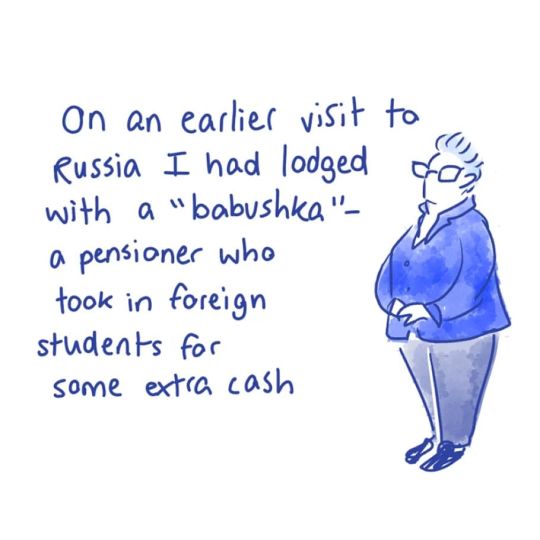

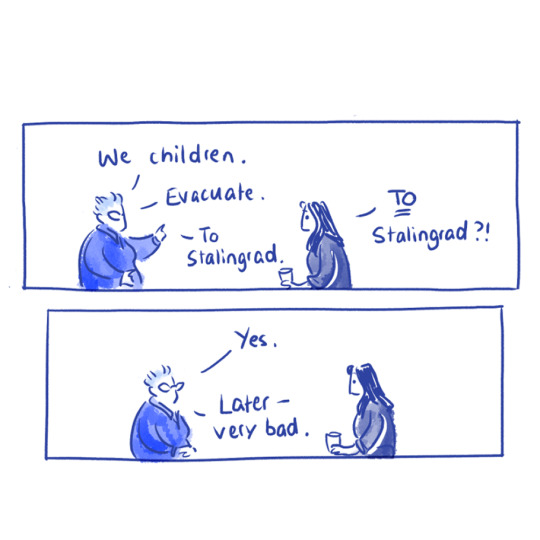
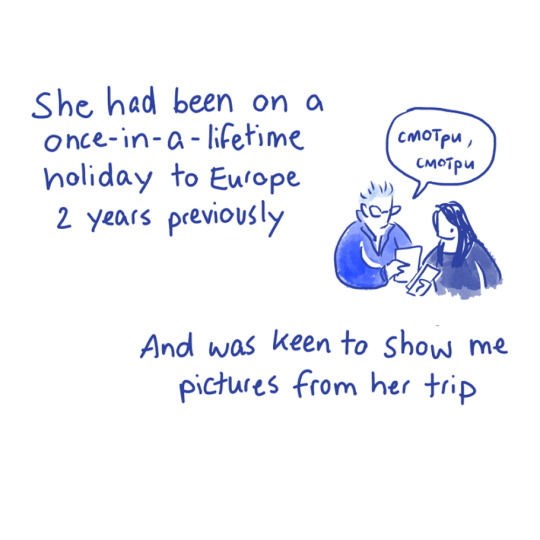
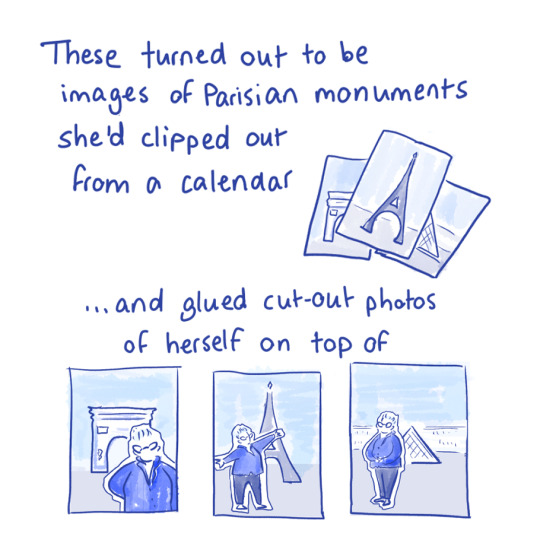

This is an excerpt from my long comic “Paris” now up on Patreon, which included this little tangent about a Russian woman I lodged with once. Iconic behaviour 🗼
This comic and others are available on my $2 Patreon tier - sign up to read them all!
https://patreon.com/emilycartoons Xx
2K notes
·
View notes
Text
youtube
Here i put it into a video for you 💕
How to build a language self-study plan

So I’ve noticed, upon combing through pages and pages of youtube videos and google blogs, that rarely does anyone ever actually tell you what you should be studying. There’s a reason for this ! Everyone is different and at a different level, different motivation. It’s impossible to create a study plan that is perfect for everyone… which is why it can also be agonizing to make one for yourself.
“How am I supposed to know what’s important to study, if I don’t speak the language?”
Well that’s a good question! You need to gauge how far you’ve come so far and how far you’d like to get. It’s easiest when you are starting from zero because you can learn the alphabet, numbers, basic phrases, and basic grammar. Easy peasy. You can go cover to cover in a text book.
Here’s a check-list to create the perfect study plan special to you.
1. What do I know already? What do I need to work on?
- is it worth starting a textbook, if you feel like you already know half of it? It might be worth completing the given exercises and if you achieve an 80% or higher (or you could give that lesson to someone else) then you can move on from that specific point.
- create a list of the points that you still need to master
2. What do I need to include in a study session?
- naturally there needs to be a focus or a few different focuses of a study session, whether it’s a specific activity or a grammar point. I recommend creating a list of things you want to get done (a.) every day, (b) every week, and © every month. These goals must be quantifiable. For example, every week I read two news articles in German. As a reflection, I then write a summary of the event of the article as well as a personal opinion. That’s an easy box to check.
- you need a reflection. It’s important to really take time to reflect on how you feel about the time spent and the materials used. What could you do better next time? What went well?
3. When is the best time to study?
- are you more active/focused in the morning or in the night? The key is consistency. If you have a routine, you’re far more likely to adhere to it. I know that my own schedule is highly changeable and that can make it very difficult, but I’ve found if I wake up in the same period of time every morning, brush my teeth, make my bed, and then sit down to my work, I feel far more productive.
- how much should I study at a time? The recommended period is 25 minutes from the Pomodoro Method with a five minute break. You can research time-management techniques but ultimately it comes down to you.
4. How do I take notes ?
- IT”S ALL ABOUT YOU! What I do is take messy notes in classes or on my own and then I transcribe the finished page to my Notion page. It gives me a chance to make the notes neater and also to review a little bit. I will say though statistically, you will remember better if you write by hand.
- I like to have a column on each page for words I didn’t know
#language#languages#language learning#french language#German language#langblr#russian langblr#langblog#german langblr#french langblr#how to learn a language#soulbutter#soul butter#soulbutter languages#soul butter languages
1K notes
·
View notes
Video
youtube
With a new year, comes new goals, new interests. Now’s the time to explore them!
Here’s how I:
- plan daily, weekly, and monthly language goals
- set up an aesthetic notion page that makes me want to engage
- plan reading goals
I hope you all have a wonderful year
love you
#language#languages#language learning#french language#German language#langblr#russian langblr#langblog#german langblr#french langblr#how to stay motivated#how to learn a language#how to learn french#how i learned french#soulbutter#soul butter#soulbutter languages#soul butter languages
14 notes
·
View notes
Text
Immersed in French Book Club Launch!
Are you interested in finding other French learners who like to read? Come join the Immersed in French Book Club discord server! This book club is a casual club for people who want to read more books in French, this doesn't just include French and Francophone literature, but also translations! Each month we will vote on a book for the club to read! There is also the option to find someone to buddy read a book of your choice with!
Invite Link
Please note: This is my first time creating and managing a discord server, it won't be perfect, that's why I need your feedback to make it better! Thank you all for your patience and support! I hope we can create a welcoming community of French learning bookworms!
139 notes
·
View notes
Text
FRENCH RESOURCES
Textbooks
French Grammar and Usage
Le Bon Usage
Verb Exercises (15 tenses + 3 other topics)
Lessons
France Université Numeratique (like Coursera)
Alliance Française on FUN [A1] [A2] [B1]
LanguageTransfer (excellent audio lessons)
FluentU on YT (advice on natural spoken French etc.)
Online Dictionaries
Larousse
Trésor de la Langue Française
Reading + Listening
RFI Savoirs* (current affairs in B1-2 level French)
FranceCulture.fr (very good radio + podcasts)
Passerelles (very nice podcast, intermediate level)
EuroNews
Arte (documentary + cultural television)
innerFrench (youtube channel)
CultureMag.fr
*link to English-language site; scroll down to access site in Spanish, Brazilian Portuguese, Russian, Mandarin, or Arabic
Art + Literature
Wikilivres (free public domain books in French)
Film Recommendations (subjective!)
Bilinguis (bilingual translations of classics)
743 notes
·
View notes